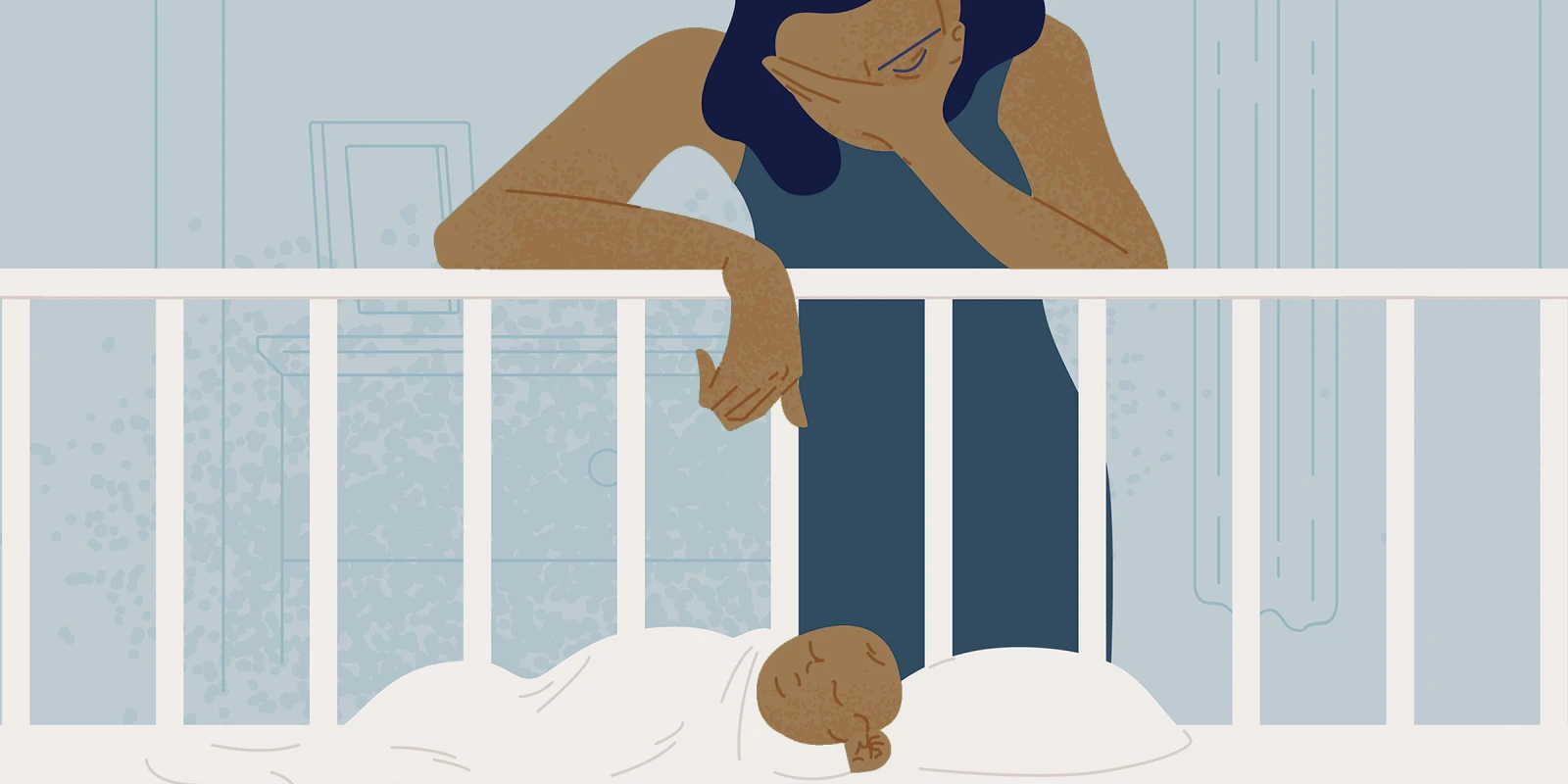“Vaginal or C-section?” the nurse asked as I settled into my seat in the exam room. She was standing in front of the computer and looked as if she wasn’t going to sit down. She started clicking on the mouse even before taking my blood pressure.
“Um, vaginal,” I replied, confused that it didn’t show up in my chart even though I had delivered my baby at the same hospital. I was 5.5 weeks postpartum and this was my first, and only, follow-up obstetrics visit. She had me fill out a postpartum depression (PPD) screening questionnaire, and apparently I passed, because no one brought it up after that.
Minutes later, an obstetrician entered the room. She was nice, professional, and didn’t know a thing about me. She asked if I needed a contraceptive and if I needed a return-to-work note. I said no to both. Which, again, led me to believe that no one had looked at the EMR. At that point, she examined me to check on the healing of my first-degree tear and the involution of my uterus. Everything checked out, I guess, because she said, “We’ll see you in a year for your annual.”
What are we talking about?
Postpartum care in America.
As a physician myself, postop checks are short. All visits for all specialties these days feel a bit rushed. But I was astounded by the lack of postpartum care for new moms. It feels as if after the “big event” of birth, the mother is kicked to the curb. Somehow, after this huge life change, the mother is supposed to handle this all on her own.
It wouldn’t be so bad if the postpartum period was easy. With minor surgeries, at least most people have resumed regular function after six to eight weeks. But the difficulties of the fourth trimester extend beyond the physical trauma of childbirth. It is a major adjustment to have a whole other human being to take care of. No one can explain, and no one would believe, how hard it is to feed a little baby, learn how they communicate, and keep them alive when you are running on two to three hours of sleep a night, with no time or energy to do anything else during the day, barely staying hydrated enough to produce an adequate amount of breastmilk. No wonder postpartum depression, anxiety, and psychosis are so rampant. No one discusses these things with new mothers.
Who provides postpartum care?
Mostly, the mother’s obstetrician, but the care team includes any perinatologists, pediatricians, lactation consultants, midwives, and doulas. Arguably, the mother’s PCP and a behavioral health specialist should be included.
To be fair, busy obstetricians who are also sleep deprived and on call and are trained to deliver babies, not to offer psychological counseling, may not be the best people to help a new mother navigate the fourth trimester. They have completed the bare minimum by performing the PPD questionnaire. Thus, postpartum care falls into the cracks, somewhere in the no-man’s land between obstetric care and psychiatric care.
Some services have stepped up to try to fill in the gaps. Postpartum doulas market their services to help and advise the mother after childbirth, but these services run into the thousands of dollars, are not covered by insurance, and often seem like a luxury for the wealthy. Lactation consultants, arguably one of the more important members of the care team, offer in-home consultations, meetings, and webinars. I would argue that postpartum wellness extends beyond lactation and breastfeeding — some mothers don’t breastfeed, for example — but there is no follow-up from the obstetricians, no automatic linking to counseling services, nothing.
Some organizations have been developed based on the need in this space, such as Check on Mom, where you can have your designated friends and relatives call or text you in the immediate postpartum period. Other websites include Momwell and Postpartum International; both have physical and psychological resources. Instagram has been a resource for many new moms. Accounts like Mamastefit highlight the importance of pelvic floor physical therapy both before and after birth, and offer additional tips besides. As a colorectal surgeon, I’ve seen my share of rectal injuries and anal issues from obstetric trauma and am always surprised at how many women are NOT referred to a colorectal surgeon until it’s a last resort.
When should postpartum care be provided?
The World Health Organization recommends at least four postpartum visits in the first six weeks for the new mother and baby. The 2018 American College of Obstetricians and Gynecologists guidelines recommend a postpartum visit within three weeks after giving birth, “concluding with a comprehensive postpartum visit no later than 12 weeks after giving birth.” Although the guidelines allow physicians to tailor these visits to the individual patient, the majority of my friends reported a six-week follow-up, and that was it. Two friends who had C-sections had a wound check at two weeks postpartum. According to the guidelines, components of the postpartum visit include assessing mood (the PPD questionnaire), infant feeding (“Are you breastfeeding? You are? Good, keep it up for at least six months.”), contraception and birth spacing (“Do you need birth control? We recommend waiting a year before trying again.”), sleep (“Are you sleeping?”), physical recovery (“We’ll take a look at your tear.”), chronic diseases (“You passed the glucose test.”), and health maintenance (“Come back in a year for your annual pap.”). So, while in retrospect, all of these items were addressed, the perfunctory attitude of these visits majorly misses the mark in evaluating how the new mother is overall.
Why do we need postpartum care?
An informal poll of all my friends who have recently had babies suggests that my experience was not unique. In fact, the feeling that postpartum care in America is pretty lacking seems ubiquitous. The ones who did have some form of care, such as doulas or night nurses, paid for these services out-of-pocket.
In Chinese culture, the first forty days postpartum is called a “confinement” or “laying-in” period, where the new mother stays mostly indoors for the entire time while women relatives cook nutritious foods and soups, do housework, and take care of the baby while the mom rests. The importance of this confinement is such that some Asian countries have whole “postpartum centers” dedicated to the care of new moms and newborns. One of my friends had the luxury of staying at one of these centers in Taiwan. She was served three meals a day; they had a spa with massages; there were nurses who took care of the baby and answered questions if the new parents had them; there were lactation consultants on site; and there were activities, like arts and crafts, for the mom. When I first heard of this, I was astounded. Apparently, it’s common in Asia and somewhat affordable, although still a personal expense and not covered by insurance. In the U.S., I recently heard about Boram in New York City, a similar postpartum care setup, but it costs over $900 a night and is not covered by insurance.
How do we provide adequate postpartum care?
Postpartum care shouldn’t be a luxury few can afford. It should be part of our health care system. However, since postpartum care falls somewhere between physical and psychological needs, the assignment of responsibility falls in between the cracks. Is the lack of postpartum care due to our payer-led system that does not reimburse for something that does not generate much revenue? Or is the lack of postpartum care another way that the system neglects women’s bodies? The same way that we do not consider motherhood of value, we do not consider the care of new mothers worthwhile.
Those first few weeks are critical in the birth of a new family. The transition from womb to world and from personhood to parenthood isn’t easy. Having the time and space to care for, nurture, and learn about each other is essential for everyone’s development. But this postpartum period exists in a clinical gray area where multiple physicians do not reach, leaving new parents searching in the darkness for answers.
How do you think postpartum care in America can be improved? Share in the comments.
Dr. Carmen Fong is a colorectal surgeon who recently moved from New York City to Atlanta, Georgia, with her wife and two cats. When she is not writing, she enjoys cooking, drawing cartoons, and reading about the mysteries of the universe. She can be found on Instagram @drcarmenfong and on Twitter @Carmen_FongMD. Dr. Fong is a 2022–2023 Doximity Op-Med Fellow.
Image by GoodStudio / Shutterstock







